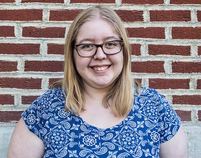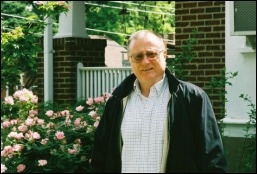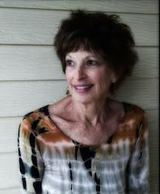 Kasy Long is a senior creative writing major at Ohio Northern University. Her work has appeared or is forthcoming in The Sigma Tau Delta Rectangle, Otoliths, The Sucarnochee Review, Glass Mountain, The RavensPerch, and Polaris Literary Magazine. In her free time, she watches I Love Lucy, reads Emily Dickinson’s poetry, and dreams about the beautiful Lake Chautauqua in western New York. After graduation, she hopes to work in communications for a thriving cultural museum. Infinite World of Curiosity An open textbook carefully highlighted with blue ink sits on a wooden desk. A pair of dark brown glasses rest on the crack between the two pages; specks of dust clutter the lens. The window blinds are tilted open, allowing the bright streetlamp from outside the apartment to fade into the study room. James Horner’s orchestral scores play softly from a sound system, the sound bouncing off the painted white walls. A journal is left open next to the textbook, with musings scribbled in a pale pencil lead marking. The girl returns to the study—her blond hair still wet from her evening shower. She sits down at the desk and places the glasses around her ears. She cleans away the dust and smudges from the day. Her mind switches gears as she turns to the book in front of her. She grabs her blue highlighter and reads, her eyes skimming over the lines on the page while her head nods to the beat of the music. She makes a note of a question that arises upon her reading, and her curiosity builds as she ponders the answer. She turns her head toward the window and releases a sigh as her mind travels upward and beyond the space of the room to the land of infinite curiosity.
0 Comments
 Donal Mahoney, a native of Chicago, lives in St. Louis, Missouri. He has worked as an editor for The Chicago Sun-Times, Loyola University Press and Washington University in St. Louis. His fiction and poetry have appeared in various publications, including The Wisconsin Review, The Kansas Quarterly, The South Carolina Review, The Christian Science Monitor, Commonweal, Guwahatian Magazine (India), The Galway Review (Ireland), Public Republic (Bulgaria), The Osprey Review (Wales), The Istanbul Literary Review (Turkey) and other magazines. Some of his work can be found at http://eyeonlifemag.com/the-poetry-locksmith/donal-mahoney-poet.html#sthash.OSYzpgmQ.dpbs A Trick My Father Learned in Prison I’m not saying my father hated the English, God forbid. If he were still alive, he’d hate to hear me say that. He’d correct me right away and say he didn’t hate the English. Truth be told, he despised the English, especially the Black and Tans. They were the troops the English sent to take over Ireland before, during and after the Troubles in 1916. That was the time when the Irish first fought seriously for their independence. My father would tell me often about what the Black and Tans did to him in 1920 at age 16 when he was captured while running guns for the IRA through marshes in rural Ireland. He knew the marshes in County Kerry very well because he was reared there as a farm boy. The IRA thought a boy like him would never get caught. But a boy carrying guns was not a common sight in the marshes of County Kerry. The Black and Tans put him in a cell with a dirt floor. He sat on that dirt for a month after they broke both his legs with rifle butts. They were in no hurry to summon a doctor. A cellmate gave him a pad of paper and he would sit on the dirt writing his name backwards with his left hand until his signature matched the normal one written with his right hand. Decades later in America, after he had been expelled from Ireland and had married my mother and settled down with a job in Chicago, I heard many stories not only about his life in a jail cell but his life milking cows and goats on a dairy farm as a young boy. He had to do that if he wanted his oatmeal for breakfast. I was in grammar school in the Forties when I heard a lot from my father about the Irish seeking their independence. His stories were a lot better, I thought, then paying 25 cents on Saturday afternoon to see a Western with Gene Autry at the local movie house, even if the movie was followed by 25 color cartoons. One day after school I had some friends over at the house. My father, a man of many moods not identified yet as PTSD, took a pad of paper and with a pen in each hand signed his name forward with one hand and backward with the other simultaneously. He then held the pad up to the long mirror in the hallway and, of course, the signatures were identical. My friends and I, crowded around him, were very young but even if we had been adults we would still have been amazed. After my friends went home, I asked my father how he learned to do that and he told me about the Black and Tans, their gun butts and that pad of paper the cellmate gave him. Rather than write letters to his family and upset them by letting them know he was in prison, he practiced writing his signature backwards with his left hand. This was one of a number of odd things that my father had mastered, all of them interesting to a child, but not worth going into at the moment or I’d be typing for a long time. Eventually I grew up, went to college, married and moved to another city and my father wanted to come and visit us and see his first grandson. Fine with me, I thought. I just hoped his affable mood would last and not disappear during the visit. I didn’t want to impose on him the nighttime crying of an infant since he had lived through that with me as a colicky child and my mother said he didn’t weather it well, having to get up early for work the next morning. So I decided to get him a room at a nice hotel. However, I picked the wrong one. I made the mistake of making a reservation for him at the Henry VIII Hotel, named after the English monarch. I can still hear my father yelling when I mentioned the Henry VIII Hotel over the phone. Indeed the Henry VIII was a nice hotel decorated in an English style that would truly have enraged my father. It was torn down not long after he died. But he had never been a guest at the Henry VIII, having stayed at another hotel free of any English taint. And his visit went well, all things considered. No outbursts or commotion. Had he lived long enough, however, my father probably would have been far more upset to learn years later that his grandson, after graduating with honors from the University of Chicago, went to England to study at Oxford as a Rhodes Scholar. Tuition, room and board and books were free but Oxford, of course, was in England. And it was England that had sent the Black and Tans to Ireland and it was the Black and Tans who had broken my father’s legs. Sometimes I think about what it might have been like had he lived long enough to learn that my son had won that scholarship. I imagine calling him to tell him the news. And suddenly I can hear him yelling louder than when I told him about the Henry VIII Hotel. This time he would sound like a muezzin in a minaret on top of a mosque. Only he wouldn’t be summoning the faithful to prayers.  Making people laugh, especially while they’re swallowing big spoonfuls of soup, is one of Diane Malk’s goals. She is a writer from Colorado who shudders at the sight of snow every winter and is certain she lived in the tropics in a previous life. Diane has been published in Mad Swirl and Hackwriters. She is working on her first book. Give Me That Old Time Religion When I was young one of my kindergarten classmates asked me, “Why did you kill Jesus?” I didn’t know how to respond. First of all, I wasn’t really sure who Jesus was, and secondly, I was pretty sure I hadn’t killed anyone. Not lately anyway. When I got home that day and told my mother about the incident, she sighed and said it was complicated — she’d explain it to me someday. Meanwhile, I shouldn’t worry. A few months later it was time for our annual winter pilgrimage to northern California to visit my grandparents. After closing the last suitcase, my mother sat down on the bed and firmly announced, “When we visit Grandma and Grandpa this year I don’t want you spouting off about the little Christmas tree we have. And as long as we’re on the subject you need to know that there’s no such thing as the Easter Bunny and there’s no Santa Claus — remember we’re Jewish!” This was a lot of information to take in at the time. I had no idea what that statement meant, but it didn’t sound good. Besides, I liked having the little tree with all the colorful blinking lights. When my uncle had noticed me looking longingly at our neighbors’ Christmas trees he handed money to my father and said, “Go get that child a tree.” So there it stood, tucked away in a corner of the living room — our first and last Christmas tree. My mother was justified in forewarning me since religion was an important aspect of my California grandparents’ lives. My grandfather had fled Lithuania as a young boy due to his religion. My mother continued, “We don’t want to upset them with our heathen ways.” “Heathen?” I asked. “Your grandparents are Orthodox, they go to temple every week. We are Reform. We only go twice a year. We’re more like Jews Lite.” “Oh.” I nodded and pretended I understood just so I could get back to doing whatever it was I was doing before. So, I kept my mouth shut during that trip and occupied myself by spinning the dreidel and pondering the fact that we were different. And if anyone asked me again why I killed their Lord, I’d just say he lived way back in history and I never met him. |
ArchivesCategories
All
|
 RSS Feed
RSS Feed